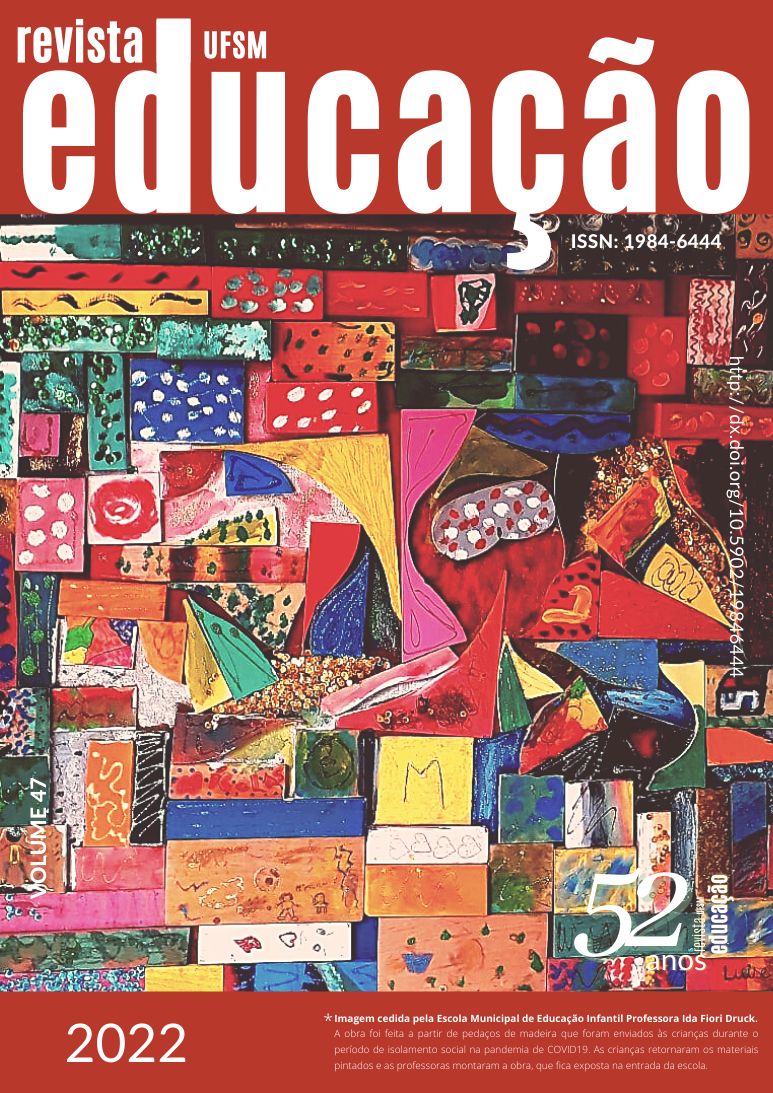Portuguese language teaching in contemporary society: from the study of art to the construction of didactic-digital literacies
DOI:
https://doi.org/10.5902/1984644448215Keywords:
Teacher education, Teaching of Portuguese language, Multiliteracies Didactic Program, Didactic-digital literacyAbstract
The influence of digital technologies on contemporary literate social practices requires didactic skills from teachers. The teaching we offer in teacher training courses needs to offer teaching that dialogs with the new reality of language, in which everyone is connected. In this study, we aim to discuss the proposal for a Multiliteracies Didactic Program that provided the opportunity for the development of teachers didactic-digital literacies. A survey was made at the Digital Library of Theses and Dissertations (2000–2018) in Brazil, as well as articles published in the Latin American Journal of Educational Technology (2002-2017), with the aim of identifying which trends are being academic productions present in investigations on digital literacy in teacher education. Through bibliographic, analytical and descriptive research, in a methodological perspective of the State of the Art, we identified the gap to propose the Multilanguage Didactic Program. Based on Literacy Studies, studies on Teacher Education and reflective writing, we realized that research is still incipient when dealing with digital literacy of teachers in a didactic aspect. This makes it difficult to appropriate technological artifacts as teaching instruments. In view of this, we present our collaborative teaching-learning path that provided the training teachers with the construction of their didactic-digital literacies.
References
ALMEIDA, M. E. B.; VALENTE, J. A. Tecnologias e currículo: trajetórias convergentes ou divergentes? São Paulo: Paulus, 2011.
BARTON, David; LEE, Carmen. (orgs.). Linguagem on line: textos e práticas digitais. 1. Ed. São Paulo: Parábola Editorial, 2015.
BRASIL. Base Nacional Comum Curricular – BNCC. Ministério da Educação (MEC), 2018. Disponível em: http://basenacionalcomum.mec.gov.br/images/BNCC_EI_EF_110518_versaofinal_site.pdf, Acesso: 15/03/2020.
BUENO, L. A construção de representações sobre o trabalho docente: o papel do estágio. Tese de Doutorado, LAEL/ PUC SP, 2007.
CANI, Josiane Brunetti. Letramento digital de professores de língua portuguesa: cenários e possibilidades de ensino e de aprendizagem com o uso das TDIC, 2019. Tese (doutorado) – Universidade Federal de Minas Gerais, Faculdade de Letras.
COSCARELLI, C. V.; KERSCH, D. F. Pedagogia dos multiletramentos: alunos conectados? Novas escolas + novos professores. In: Dorotea Frank Kersch; Carla Vianna Coscarelli; Josiani Brunetti Cani. (Org.). Multiletramentos e multimodalidade: ações pedagógicas aplicadas à linguagem. 1ed.Campinas: Pontes Editores, 2016, v. 1, p. 7-14.
HEATH, S. B.; STREET, B. On Etnography: Approaches to Language and Literacy Research. New York: Teachers College Press, NCRLL, 2008.
GUIMARÃES, A. M.; CARNIN, A.; KERSCH, D. (Org.). Caminhos da construção: reflexões sobre projetos didáticos de gênero. Campinas, Mercado de Letras, 2015.
KENSKI, Vani Moreira. Educação e tecnologias: o novo ritmo da informação. 8. ed. Campinas, SP: Papirus, 2011.
KERSCH, D. F.; MARQUES, R. G. Projetos didáticos de gênero, multimodalidade, uso de tecnologias e participação em comunidade de prática: uma experiência na inicial formação de professores. In: Ana Maria Mattos Guimarães; Delaine Cafiero Bicalho; Anderson Carnin. (Org.). Caminhos da Construção - Formação de professores e ensino de língua portuguesa. 1ed.Campinas: Mercado de Letras, 2016a, v. 4, p. 115-144.
KLEIMAN, A. B. Letramento na contemporaneidade. Bakhtiniana, São Paulo, 9 (2): 72-91, Ago./Dez. 2014.
LANKSHEAR, Colin & KNOBEL, Michele. Digital literacies: concepts, policies and practices. General Editors, v. 30, 2008. Disponível em: https://researchonline.jcu.edu.au/27788/1/27788_Lankshear_and_Knobel_2008.pdf
MACEDO, Ana Cleides Maciel; MARTINS, Ana Patrícia Sá. FORMAÇÃO DOCENTE E
LETRAMENTO DIGITAL NA EDUCAÇÃO SUPERIOR: desafios para integração das tecnologias nas praticas pedagógicas do futuro professor de lingua portuguesa. Relatório
PIBIC FAPEMA 2018-2019. Seminário de Iniciação Científica da Universidade Estadual do Maranhão.
MACHADO, Anna Rachel (org.). O ensino como trabalho: uma abordagem discursiva. Londrina: EDUEL; São Paulo: FAPESP, 2004.
MARTINS, Ana Patrícia Sá. Processos de (trans) formação de futuros professores e a construção de Letramentos didático- digitais. Tese de Doutorado. Disponível em: http://www.repositorio.jesuita.org.br/bitstream/handle/UNISINOS/9126/Ana%20Patricia%20S%C3%A1%20Martins_.pdf?sequence=1&isAllowed=y
MOITA LOPES, L. P. (Org.) Por uma linguística indisciplinar. São Paulo: Parábola Editorial, 2006.
NÓVOA, António (org.). Profissão professor. Portugal: Porto Editora, 1995.
OECD. Education at a Glance 2019: OECD Indicators, OECD Publishing, Paris, 2019.
PIMENTA, Selma Garrido (org.), Saberes pedagógicos e atividade docente. São Paulo: Cortez, 2012.
PINTO, Cândida Martins. Metanálise qualitativa de investigação brasileira sobre letramento digital na formação de professores de línguas do RS. Tese (doutorado) – Universidade Católica de Pelotas, Programa de PósGraduação em Letras, Pelotas, 2015.
ROJO, R. (Org.). Escol@ conectada: os multiletramentos e as TICs. São Paulo: Parábola, 2013.
ROJO, R.; BARBOSA, J. P. Hipermodernidade, multiletramentos e gêneros discursivos. São Paulo: Parábola, 2015.
SILVA, Frederico Augusto Barbosa da. Et al. As Tecnologias digitais e seus usos. Instituto de Pesquisa Econômica Aplicada – (Ipea), 2019. Disponível em: https://www.ipea.gov.br/portal/images/stories/PDFs/TDs/td_uuu2470.pdf. Acesso: 21/04/2020.
Published
How to Cite
Issue
Section
License
Copyright (c) 2022 Educação (UFSM)

This work is licensed under a Creative Commons Attribution-NonCommercial 4.0 International License.
Declaration of originality
We declare that all articles present in the journal Educação (UFSM) are originals and were not submitted for publishing on any other publication, as a whole or a fraction. We also declare that, after being published by Educação (UFSM), a paper will not be submitted to another journal within two years. After this time, our journal transfers the publishing rights to the authors, with a permit granted by the Editorial Council.
We also acknowledge that the originals’ submission to Educação (UFSM) implies on a transference of copyright for physical and digital publishing to the journal. In case of noncompliance, the violator will receive sanctions and penalties predicted by the Brazilian Copyright Protection Law (n. 9610, dated 19/02/98).
Attribution 4.0 International (CC BY 4.0)
This license lets others remix, transform, and build upon the material for any purpose, even commercially, and copy and redistribute the material in any medium or format.

This work is licensed under a Creative Commons Attribution 4.0 International (CC BY 4.0)






